- Home
- Anne Bennett
Forget-Me-Not Child Page 20
Forget-Me-Not Child Read online
Page 20
That had been the lot of many women. There was very little slack and anything could tip the balance, boots needing heeling, a harsh long winter meaning an extra hundredweight of coal, a sick child needing the services of a doctor, any of these could send them into rent arrears.
She had remarked on this just that morning to Mary. ‘I can’t help feeling a bit guilty,’ she admitted. ‘I served many women like that in the shop while we are sitting pretty because Barry is an indentured toolmaker, and a supervisor to boot, so he gets good money and even if there is a call-up he will not have to go and fight anyone, but these women’s lives will just get worse.’
‘Maybe not,’ Mary said. ‘Those women married to heavy drinkers or gamblers might fare better. I don’t know what a soldier is paid but I imagine there is some system in place to pay something out to their wives and more especially if they have children. T’isn’t as if they’ll have a boozer on every corner of a French field, or a cosy betting shop set up in the trenches they say they’re fighting in. Now if, as well as the Army pay, they were to get themselves a little job, which seems as easy as blinking these days, they might have more money than they have ever had in their lives without a husband tipping it down his throat, or putting it all on a horse. Tell you, Angela, while I can never agree with war and there will be a great many men killed and terrible hardship, this war will be the making of some women.’
Angela had agreed with Mary and as she trudged home that day, lugging the overloaded pram after her, she thought of the women she’d served who’d had even less to spend than their neighbours because of their husbands’ excesses. They were the fathers of the children hanging around the pub doors on a Friday night, each trying to get some money from their father before he blew it all. They were the fathers who gave their wives so little she could only afford to feed one person anything decent and that had to go to the husband because he was the breadwinner. The woman and children would usually live on bread and scrape and not much of that and the children were usually dressed in ragged clothes and were barefoot.
It always saddened Angela to see them so skinny, with their gaunt pasty faces. Oh yes, if the women married to such men could now get enough to feed themselves and the children properly and have boots on their feet and coats on their backs, it had to be a good thing. And as she reached home with an immense sigh of relief, she thanked God that she was married to such a good, kind and considerate man.
The big freeze went on through January, but soon people had more to worry about than the weather because on the night of 9th January two Zeppelins dropped bombs on King’s Lynn and Great Yarmouth killing four, injuring many more and causing £7,000 worth of damage. The whole country was stunned and scared. They knew England was at war, but that was about soldiers and sailors and battles. The thought that innocent and unarmed civilians could be killed by bombs from the air was beyond their understanding. It was pulling everyone into the front line.
Barry felt sick to the pit of his stomach as he looked at the grainy photographs in the paper a couple of days later and saw the scale of the destruction and bemused people standing in the ruins of what had once been their houses and he wondered how Britain could hope to fight this airborne enemy.
Just days after this, Barry picked up the letter from the mat that had been pushed through the letter box and when he opened the envelope three white feathers fell out and he suddenly felt very cold and ashamed. Angela, coming into the room at that moment with Connie in her arms, saw his white face and the opened envelope beside him and fearing further bad news cried, ‘What is it?’
Barry moved his arm so she could see the feathers as he said, ‘Nothing much. Just what they send to all the cowards dodging war.’
‘You’re no coward.’
‘Am I not?’ Barry said sarcastically. ‘Didn’t I grasp Stan’s get-out clause a little too eagerly?’
‘It made sense, that’s why,’ Angela said. ‘You have a wife and child.’
‘D’you know, Angela, there are thousands of men at the Front,’ Barry said. ‘Don’t you think some of them might be husbands and fathers too?’
Angela wasn’t ready to face this yet, so instead of answering she said, ‘I can’t understand who would do this and upset us all so.’
‘Oh you would be spoilt for choice as to who has done this,’ Barry said. ‘I can’t meet the eyes of some I see at Mass knowing their sons will never come home again. And we’re being snubbed by families we have known for years. I’ve noticed so I’m sure you have.’
Angela couldn’t disagree with him and she nodded her head mutely.
‘And that’s another thing,’ Barry said. ‘One of the reasons Stan went to war was for Daniel. He said if he doesn’t make it Daniel will get to read the letter he has left for him when he is twenty-one when he will also find out about the money. Knowing Stan as I do, when Daniel reads that letter he’ll know straight away what a fine man his father was and be proud that he died doing something worthwhile.
‘Stan said it would be totally different for Connie and how readily I believed him. He said she would understand that I couldn’t go to war and leave everyone, but will she understand that when she’s a little older and the other children are recounting what their dads did in the war? What will she say then? And there will be plenty about to tell her what a coward I was because they would overhear adults talking. I might never know who sent those feathers but whoever it was, they were only expressing what everyone else is thinking.’
Angela would have liked to refute what Barry said but she couldn’t for she knew it was too true. She had been snubbed and had snide remarks directed at her, and she knew children were very cruel when they wanted to be. She had experienced bullying herself, but not for long because she had Barry and his four big brothers to protect her, but Connie might have no one and any of the children who had lost a father, a favourite brother or an uncle might think taunting and mocking Connie might be a suitable distraction to help them cope with the pain of loss. And Connie would be considered fair game because her father was named as a coward.
Angela tried not very successfully to stem the flow of tears as she said, ‘So you’ve decided to enlist?’
Barry nodded. ‘I think it’s time I did,’ he said and his arms encircled his wife and the child she was still holding as he went on, ‘What finally decided me were the bombs. They could be dropped from the sky to land anywhere and Britain has got nothing to counteract them and so we have to go over there and stop them now, for I don’t think that attack will be the last by any means and I think the Army needs every man jack of us. No one should sit on the fence on this one because our loved ones here are in danger. I always said I would fight if my family were threatened and bombs dropping from the sky mean just that and I must try and protect you.’
He lifted his hand, suddenly releasing Angela as he said, ‘Ssh, I hear Mammy stirring in the attic. Not a word to her now, I want to tell her when I have got time to explain it all, for it will be hard for her because she has already lost two sons, but I’ll have to leave now really.’
‘You’ve had no breakfast,’ Angela said. ‘Not even a sup of tea.’
‘No matter,’ Barry said. ‘I can probably pick something up in the canteen.’
Angela heard Mary’s ponderous tread on the lower steps and she quickly scrubbed the tears from her eyes and scooped the envelope and feathers into her cardigan pocket as Mary came into the room. But she had eyes only for her son. ‘Are you still here?’ she said for he was late leaving.
‘I’m just away, Mammy,’ he said, taking his coat from the hook at the back of the door as he spoke and with a kiss for Angela and Connie he was gone.
Barry told Mr Baxter of his decision immediately and could see how pleased he was and he got from behind his desk and shook him by the hand. ‘I’m sure you’re doing the right thing,’ he said decidedly and Barry was glad of Mr Baxter’s enthusiasm for it buoyed up his own, which had evaporated somewhat on the journey to w
ork.
‘Now,’ Mr Baxter said. ‘Have you anyone earmarked to take your place?’
‘No, not really,’ said Barry. ‘Though I have been mulling through the idea of enlisting for some time, I only made the final decision when those bombs were dropped in Norfolk.’
‘Yes, shocking wasn’t it?’
‘Yes and bombs from the air mean our loved ones aren’t safe,’ Barry said. ‘Britain hasn’t got anything like those Zeppelins, I don’t think. So I thought the only thing to do was get over there as quick as possible and stop whoever is sending them. And I thought they would need every man they could get and what was I doing in a cushy number like the factory when I could be helping?
‘As for who will take my place?’ Barry went on. ‘Sir, those women have shaped up better than I could ever have imagined and I could name half a dozen that could do the job quite as well as I can, but Pearl Mason will have a little bit of authority among the younger girls and she’s well liked and also has a head on her shoulders.’
‘Good, those are the qualities needed,’ Mr Baxter said approvingly. ‘Now I suggest you make your announcement to the girls on the shop floor immediately before the machines are started up, then you can make your way to Thorp Street Barracks. Send this young Pearl Mason to me.’
‘You want me to go to Thorp Street Barracks today?’ Barry cried incredulously.
‘One thing I do know about war is that there is no place for shilly-shallying,’ Mr Baxter said. ‘You already said that you’ve thought about it for some time. Well waste no more of it thinking.’
‘I haven’t even told my mother yet, sir.’
‘And is there anything your mother can do to turn you from this decision?’ Mr Baxter asked.
‘No, sir,’ Barry said decisively.
‘Well if I were you. I would get it all signed and sealed anyway,’ Mr Baxter suggested. ‘For in my experience a mother’s tears can be very persuasive, but if it is all signed and sealed, whatever she says the die is cast.’
Barry could see the sense of that because he did find it hard to stand against his mother’s tears and was well aware of his place in the family as her only son. First though, he had to tell the girls on the shop floor his intentions for he couldn’t just disappear.
He could see the workforce were intrigued when they were asked to assemble by the steps that led up to the offices and when Barry appeared at the top of those steps and told them he was enlisting, there was a little ripple of applause.
But some were perplexed for Barry had often been the topic of speculation and many had assumed, since he wasn’t in uniform like most young men his age were, he must have failed the medical. Now it appeared he hadn’t even had a medical. Barry heard the murmurings and explained that as the factory was turning out a great deal for the war effort he was in a reserved occupation, but he thought now he would be more use in the army. He got a cheer of approval for this and those who were the loudest were those who already wore the widow’s bonnet and the black armband on their overalls.
The recruitment room at Thorp Street Barracks was a long one. The wooden floor gleamed with polish and the tramp of Barry’s work boots sounded very loud as he walked the length of it to stand before the desk at the back of the room, with his heart banging in his breast and his mouth unaccountably dry.
There was a little queue of people at the barracks facing two men in uniform behind a desk. The line of men shuffled forward slowly but at last it was Barry’s turn and he saw that one of the men seemed much older than the other. The older one had a florid face and grey hair, not that Barry could see much of his face, for it was partially obscured by his large handlebar moustache. His eyes were not obscured though and they were steely blue, and he introduced himself as Colonel Sanders.
Barry was surprised at such a high-ranking officer dealing with recruitment, till he remembered Stan said they had taken a lot of the military men out of retirement to do the routine desk jobs. The other man was younger and his face was more open. He was Corporal Withers and his eyes and hair were the same soft brown.
Barry had thought his mouth too dry for him to speak normally and if he made any sort of sound at all it would come out as a squeak. However, he was able to give all the details the two men asked for and explain himself when they expressed surprise at his age for most recruits were younger.
Barry explained about the factory where he had worked since he’d left school and the vast amount of war-related things the factory was churning out. ‘I was in a reserved occupation,’ he said. ‘You see most of the workforce, who were men and boys, enlisted when war was declared, even the previous Gaffer, and someone had to teach the girls and women what to do, as none of them had done any sort of work like that before. But now the women in the workforce are up to speed as it were.’ Barry went on, ‘One of them is now quite able to take my place while I play a more active part in the war.’
‘Good man,’ Colonel Sanders said admiringly, so that even his large moustache seemed to bristle with approbation. ‘A man choosing to join in this just war, is worth ten conscripts who have to be nearly dragged in to do their duty.’
‘I didn’t know you had started the call-up, sir.’
‘We haven’t yet,’ Corporal Withers said. ‘We are getting enough volunteers at present, but that might change before the war is won, so then we will have conscription and we’ll have to try and turn reluctant young men into a fierce fighting force. But the next step for you now is for us to find out how healthy you are.’
Neither of the men were worried about Barry’s fitness for he looked a fine, strapping chap, but he was sent to the male white-coated doctor who had a stethoscope hanging around his neck. The doctor had done this many many times and took Barry’s temperature and checked his pulse rate before he weighed and measured him and sounded his chest and back. He asked him if he had any aches and pains and though Barry said he hadn’t, he was still prodded and poked. The doctor looked into Barry’s ears and his throat and examined his eyes and then, having told Barry to strip to his vest and pants, paid great attention to his legs and feet and finally he stood before the doctor who held his testicles in his hand and asked him to cough.
Barry had never been so embarrassed in his life, but for the doctor it was all in a day’s work and part of the procedure and he asked Barry to dress and said he was A1 and well able to travel overseas after training.
Barry was joining the Royal Warwickshires and he asked how much he would be paid. It was Colonel Sanders who answered, ‘You’ve heard of the King’s shilling I suppose?’
Barry gave a brief nod.
‘Well that’s what you get, a shilling a day, seven shillings a week.’
It wasn’t a lot but then Barry reasoned he didn’t need a lot, as there wouldn’t be that much to spend it on. ‘I have a wife and a child,’ he said.
‘Yes, sixpence will be deducted from your allowance for your wife and a penny for your child. The government will pay a weekly sum of one shilling and one penny a day to your wife together with the contributions from you and tuppence extra for your child from the government.’ He made a swift calculation on a notepad and said, ‘Altogether it comes to eight and fourpence a week.’
Eight and fourpence re-echoed in Barry’s brain. It was not enough, not nearly enough. By signing on the dotted line he had reduced his family to penury. Almighty Christ, what had he done? How in God’s name could they live on so little? But it was too late to think of that. His fate was sealed. ‘Can I give my wife something from my pay?’ Barry asked.
Corporal Withers nodded. ‘You can indeed. Many men do that. To claim it your wife must take your marriage lines and the child’s birth certificate and the child to the Town Hall. She must go herself, no one can go in her stead and as it may take some time to process it, she must do this without delay as soon as you start training. Have you to give notice to your present employer?’
‘He said a week, that’s all,’ Barry said.
‘Ri
ght, that will be a week today, Colonel Sanders. The 29th January, so how about you coming to the Barracks the following Monday, 1st February? Seven a.m. sharp. Don’t be late. There’s a truck leaving at a quarter past and I want you on it.’ Barry knew he wouldn’t be late, he was an early riser. That was the least of his problems and, unable to face Angela and his mother, he went back to work although Mr Baxter said he could go home after he was finished at Thorp Street. He had no desire to go home and tell them what he had done for he had made their lives even harder.
Everyone seemed to think he had done the right thing and yet the thought of them all going hungry and Connie dressed in rags and running around barefoot would be his worst nightmare come true. He groaned aloud, glad he had the office to himself, for Mr Baxter had taken himself home and advised Barry to do the same.
EIGHTEEN
Afterwards, Barry was not sure how far he walked that night, but eventually he realized he couldn’t walk all night and, even if he could, it would change nothing and he turned for home. He was mightily relieved that only Angela was in the room. She started when she saw him and her eyes he saw were full of concern and trepidation. He felt slight guilt that he had worried them so as he whispered, ‘Where’s Mammy?’
‘Putting Connie to bed,’ Angela said. ‘And having a time of it because I kept her up to see you, only she got too tired to wait any longer, though she of course she didn’t agree. Where on earth have you been till this time of night?’
Barry didn’t answer that, but what he did say was, ‘Shall I go up now?’
‘What on earth for?’ Angela asked. ‘No, you may make matters worse. Connie’s been quiet this long time so maybe Mammy’s got her off at last. I’ve kept your dinner hot, though you scarce deserve it, scaring us so. Where did you go?’

 As Time Goes By
As Time Goes By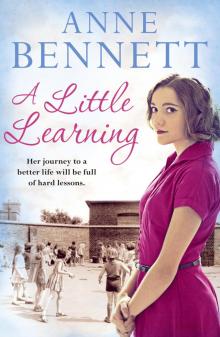 A Little Learning
A Little Learning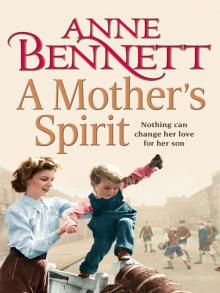 A Mother's Spirit
A Mother's Spirit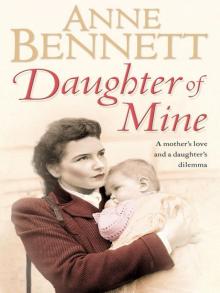 Daughter of Mine
Daughter of Mine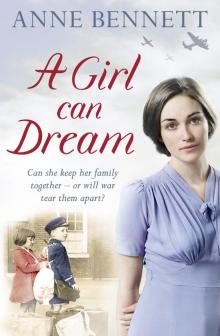 A Girl Can Dream
A Girl Can Dream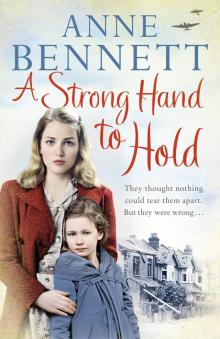 A Strong Hand to Hold
A Strong Hand to Hold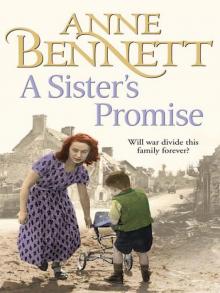 A Sister's Promise
A Sister's Promise To Have and to Hold
To Have and to Hold Pack Up Your Troubles
Pack Up Your Troubles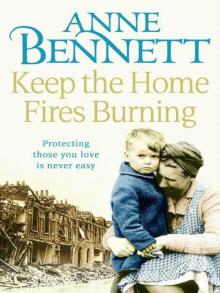 Keep the Home Fires Burning
Keep the Home Fires Burning Another Man's Child
Another Man's Child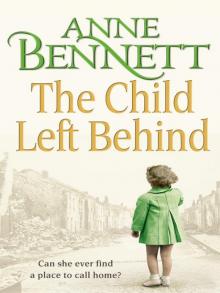 The Child Left Behind
The Child Left Behind Mother’s Only Child
Mother’s Only Child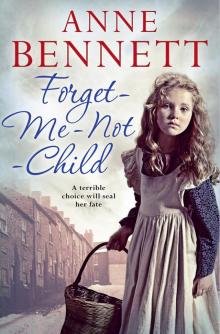 Forget-Me-Not Child
Forget-Me-Not Child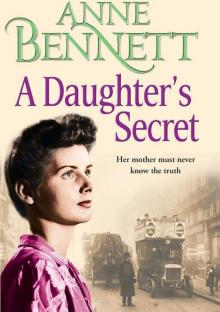 A Daughter's Secret
A Daughter's Secret Walking Back to Happiness
Walking Back to Happiness Far From Home
Far From Home Till the Sun Shines Through
Till the Sun Shines Through